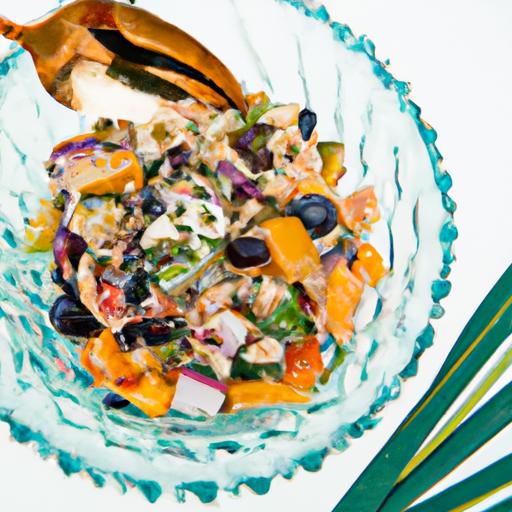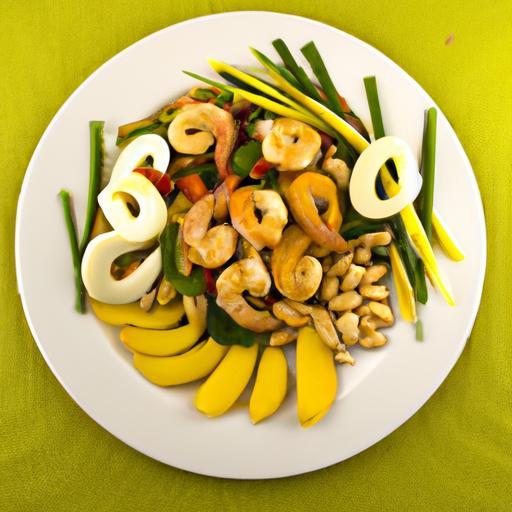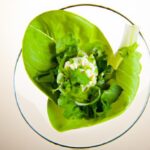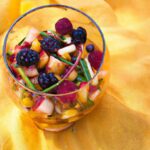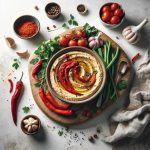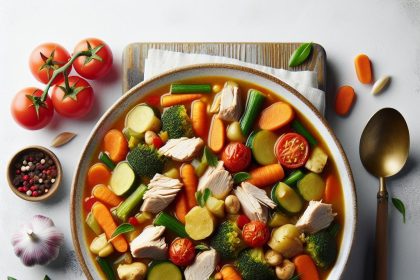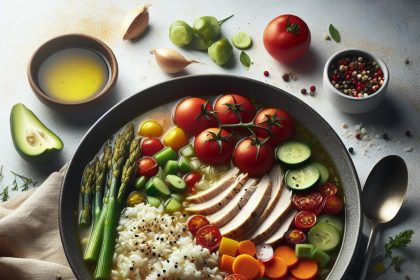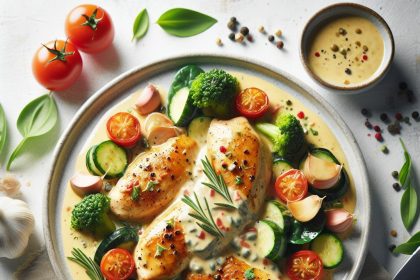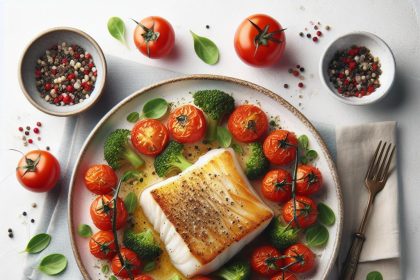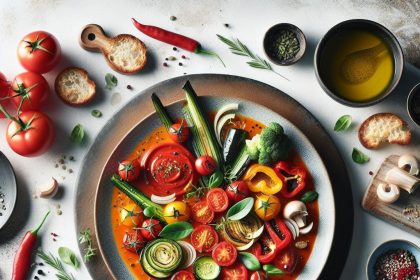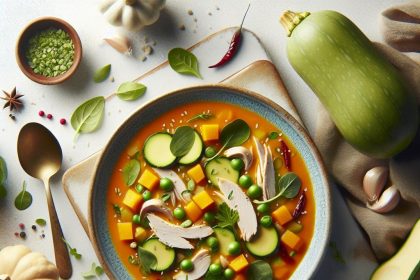In a world where wellness fads come and go, the true art of healing lies in a profound transformation – one that begins not with quick fixes, but with the very food we choose to nourish our bodies. “Transforming Diets: Your Path to Sustainable Healing Lifestyle” is an invitation to reimagine the relationship between what we eat and how we thrive. This journey is more than a change of menu; it’s a revolution towards sustainability, vitality, and holistic well-being. Join us as we explore how mindful eating habits, rooted in nature’s wisdom, can become the cornerstone of lasting health and vibrant living.
Transforming Diets: Your Path to Sustainable Healing Lifestyle
Transforming diets naturally leads to a vibrant, healthful way of living that nurtures both body and mind. This recipe embodies that philosophy by weaving together whole, seasonal ingredients that revitalise your energy and clarity. Inspired by the luscious bounty of local markets and the art of mindful cooking, this colorful Quinoa & Roasted Vegetable Buddha Bowl celebrates balance and wholesomeness in every bite.
Prep and Cook Time
Preparation: 15 minutes | Cooking: 35 minutes | Total Time: 50 minutes
Yield
Serves 4 hearty, nourishing portions
Difficulty Level
Easy – Perfect for those embracing whole foods and mindful meal planning
Ingredients
- 1 cup quinoa, rinsed thoroughly
- 2 cups vegetable broth or filtered water
- 1 medium sweet potato, peeled and cubed
- 1 red bell pepper, chopped
- 1 small red onion, sliced
- 1 cup Brussels sprouts, halved
- 2 tbsp extra virgin olive oil, divided
- 1 tsp smoked paprika
- 1/2 tsp ground cumin
- Salt and freshly ground black pepper, to taste
- 1 avocado, sliced
- Handful fresh baby spinach leaves
- 1/4 cup toasted pumpkin seeds
- 2 tbsp tahini
- Juice of 1 lemon
- 2 cloves garlic, minced
- Water, to thin the dressing as needed
Instructions
- Preheat your oven to 425°F (220°C). Toss the sweet potato, red bell pepper, red onion, and Brussels sprouts with 1 tbsp olive oil, smoked paprika, cumin, salt, and pepper. Spread them evenly on a baking sheet lined with parchment paper.
- Roast the vegetables for 25-30 minutes, stirring halfway, until caramelized and tender. Keep an eye on the edges to prevent burning.
- Meanwhile, cook the quinoa. In a medium saucepan, bring the vegetable broth to a boil. Add the rinsed quinoa, reduce the heat to low, cover, and simmer for 15-18 minutes or until quinoa is fluffy and liquid absorbed. Fluff gently with a fork.
- Prepare the tahini dressing. Whisk together the tahini, lemon juice, minced garlic, remaining 1 tbsp olive oil, salt, and pepper. Gradually add water, 1 tbsp at a time, until you reach a smooth, pourable consistency.
- Assemble your bowl. Start with a bed of baby spinach, then add a generous scoop of quinoa. Arrange the roasted vegetables beautifully on top, followed by slices of creamy avocado.
- Drizzle the tahini dressing over the bowl and sprinkle with toasted pumpkin seeds for a delightful crunch.
- Enjoy immediately or refrigerate for up to 24 hours. This vibrant dish tastes even better once the flavors meld.
Tips for Success
- Swap quinoa with farro or brown rice for an alternative grain option while keeping nutrient density high.
- Add a handful of cooked chickpeas or grilled tofu for an extra protein boost essential for lasting wellness.
- For meal prep, keep roasted vegetables and quinoa separate until serving to avoid sogginess.
- Use seasonal, local veggies to maximize freshness, flavor, and support your community’s farmers.
- If tahini is not on hand, blend plain Greek yogurt with lemon and garlic for a creamy, tangy dressing.
Serving Suggestions
Serve this bowl with a sprinkle of fresh herbs like cilantro or parsley for aromatic brightness. Pair with a crisp cucumber salad dressed lightly with apple cider vinegar for added crunch. A warm cup of herbal tea alongside elevates the mindful dining experience, fully embracing whole foods to balance nutrients that support both body and mind.

| Nutrient | Per Serving |
|---|---|
| Calories | 430 kcal |
| Protein | 12 g |
| Carbohydrates | 52 g |
| Fat | 16 g |
Explore more on mindful eating habits here.
For comprehensive nutritional guidelines on whole foods visit Harvard T.H. Chan School of Public Health.
Q&A
Q&A: Transforming Diets – Your Path to a Sustainable Healing Lifestyle
Q1: What does “transforming diets” really mean?
A1: Transforming diets goes beyond simply swapping foods-it’s a conscious shift in how we nourish our bodies, minds, and the planet. It means embracing eating habits that heal, energize, and sustain us while treading lightly on Earth. Think of it as a culinary evolution toward vitality and mindfulness.
Q2: Why is a sustainable healing lifestyle important today?
A2: In a world facing health crises and environmental strain, the way we eat holds immense power. A sustainable healing lifestyle not only restores individual well-being but also protects natural resources, reduces waste, and combats climate change. It’s a holistic approach that nurtures the cycle of life-starting with what’s on your plate.
Q3: What are the core principles of a diet that supports sustainable healing?
A3: Key principles include choosing whole, minimally processed foods; prioritizing plant-based meals; supporting local and seasonal produce; minimizing animal products; and reducing food waste. This approach fuels your body with rich nutrients while honoring the planet’s limits.
Q4: Can changing my diet really have long-term healing effects?
A4: Absolutely. Diets rich in antioxidants, fiber, vitamins, and healthy fats can combat inflammation, boost immunity, and improve mental clarity. Over time, these changes foster resilience against chronic diseases and promote balanced energy-transforming health from the inside out.
Q5: How do I start transforming my diet without feeling overwhelmed?
A5: Begin with small, sustainable swaps-like adding an extra serving of vegetables or swapping refined grains for whole grains. Experiment with new recipes, reduce single-use plastics during grocery shopping, and listen to your body’s hunger cues. Remember, transformation is a journey, not a race.
Q6: Is a plant-based diet the only path to sustainable healing?
A6: Not necessarily. While plant-based diets are often more sustainable due to lower environmental footprints, a healing lifestyle can include responsibly sourced animal products in moderation. The emphasis is on mindfulness, quality, and balance, rather than rigid restrictions.
Q7: How does food waste fit into the idea of sustainable healing?
A7: Food waste is a major environmental and ethical issue. Reducing waste means respecting resources and improving your connection to food. Planning meals, storing produce properly, and creatively using leftovers are powerful ways to close the loop and practice sustainability on a personal level.
Q8: What role does community play in transforming diets?
A8: Community is the heartbeat of sustainable healing. Sharing food traditions, growing gardens, supporting local farmers, and learning from each other build bonds that nourish culture and ecology. Together, we amplify individual efforts into meaningful change.
Q9: Can transforming my diet influence mental and emotional health?
A9: Yes! Nutrient-dense foods directly affect brain chemistry and mood. Eating mindfully and sustainably fosters a sense of purpose and calm. In turn, this holistic balance promotes emotional resilience, creativity, and overall happiness.
Q10: Where can I find resources to guide my pathway to a sustainable healing lifestyle?
A10: Start with credible nutrition experts, sustainability organizations, and local food co-ops. Look for cookbooks focused on seasonal, plant-forward meals, and explore workshops or community-supported agriculture programs. Online forums and apps can also offer personalized support as you embark on this transformative path.
Embrace the power of your plate. Transforming diets isn’t just a change-it’s a lifelong embrace of healing, harmony, and hope.
Wrapping Up
As you step forward on your journey toward a sustainable healing lifestyle, remember that every bite is a choice-an invitation to nourish not just your body, but the planet as well. Transforming your diet isn’t about restriction; it’s about awakening to the vibrant possibilities that whole, mindful foods offer. Let this path be a celebration of renewal, where each meal becomes a seed of healing, growth, and harmony. Embrace the transformation, and watch as your life-and the world around you-flourish in response. The journey to sustainable wellness begins on your plate, but its impact resonates far beyond.